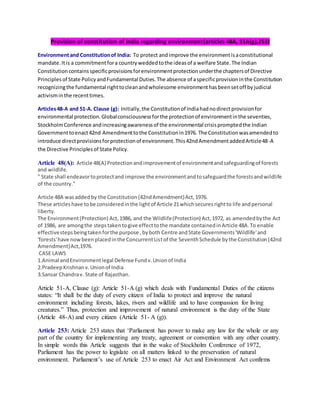Provision of constitution of india regarding environment
- 1. Provision of constitution of India regarding environment(articles 48A, 51A(g),253) Environmentand Constitutionof India: To protect andimprove the environmentisaconstitutional mandate.Itis a commitmentfora countryweddedtothe ideasof a welfare State.The Indian Constitutioncontainsspecificprovisionsforenvironmentprotectionunderthe chaptersof Directive Principlesof State PolicyandFundamental Duties.The absence of aspecificprovisioninthe Constitution recognizingthe fundamental righttocleanandwholesome environmenthasbeensetoff byjudicial activisminthe recenttimes. Articles48-A and 51-A. Clause (g): Initially,the Constitutionof Indiahadnodirectprovisionfor environmental protection.Globalconsciousnessforthe protectionof environmentinthe seventies, StockholmConference andincreasingawarenessof the environmental crisispromptedthe Indian Governmenttoenact42nd Amendmenttothe Constitutionin1976. The Constitutionwasamendedto introduce directprovisionsforprotectionof environment.This42ndAmendmentaddedArticle48-A the Directive Principlesof State Policy. Article 48(A): Article 48(A) Protectionandimprovementof environmentandsafeguardingof forests and wildlife. " State shall endeavortoprotectand improve the environmentandtosafeguardthe forestsandwildlife of the country." Article 48A wasaddedby the Constitution(42ndAmendment)Act,1976. These articleshave tobe consideredinthe lightof Article 21whichsecuresrightto life andpersonal liberty. The Environment(Protection) Act,1986, and the Wildlife(Protection) Act,1972, as amendedbythe Act of 1986, are amongthe stepstakentogive effecttothe mandate containedinArticle 48A.To enable effectivestepsbeingtakenforthe purpose ,byboth Centre andState Governments'Wildlife'and 'forests'have nowbeenplacedinthe ConcurrentListof the SeventhSchedule bythe Constitution(42nd Amendment)Act,1976. CASE LAWS 1.Animal andEnvironmentlegal Defense Fundv.Unionof India 2.PradeepKrishnanv.Unionof India 3.Sansar Chandrav. State of Rajasthan. Article 51-A, Clause (g): Article 51-A (g) which deals with Fundamental Duties of the citizens states: “It shall be the duty of every citizen of India to protect and improve the natural environment including forests, lakes, rivers and wildlife and to have compassion for living creatures.” Thus, protection and improvement of natural environment is the duty of the State (Article 48-A) and every citizen (Article 51- A (g)). Article 253: Article 253 states that ‘Parliament has power to make any law for the whole or any part of the country for implementing any treaty, agreement or convention with any other country. In simple words this Article suggests that in the wake of Stockholm Conference of 1972, Parliament has the power to legislate on all matters linked to the preservation of natural environment. Parliament’s use of Article 253 to enact Air Act and Environment Act confirms
- 2. this view. These Acts were enacted to implement the decisions reached at Stockholm Conference. Environment and Citizens: The Constitution of India has made a double provision: (i) A directive to the State for protection and improvement of environment. (ii) Imposing on every citizen in the form of fundamental duty to help in the preservation of natural environment. This is the testimony of Government’s awareness of a problem of worldwide concern. Since protection of environment is now a fundamental duty of every citizen, it is natural that every individual should do it as personal obligation, merely by regulating the mode of his natural life. The citizen has simply to develop a habitual love for pollution.

